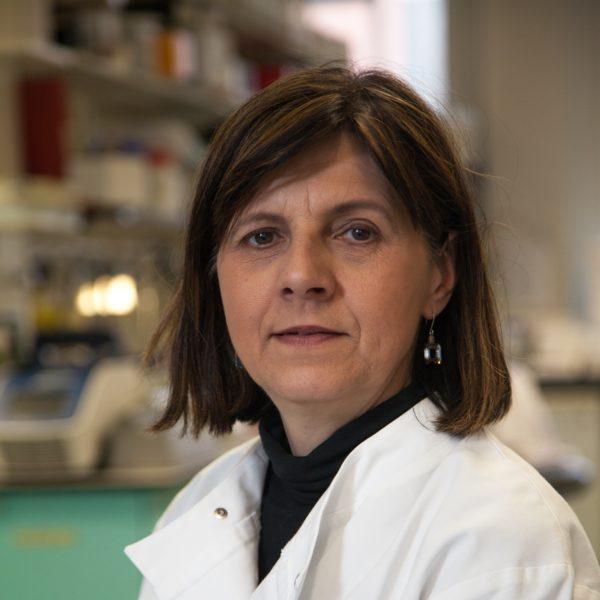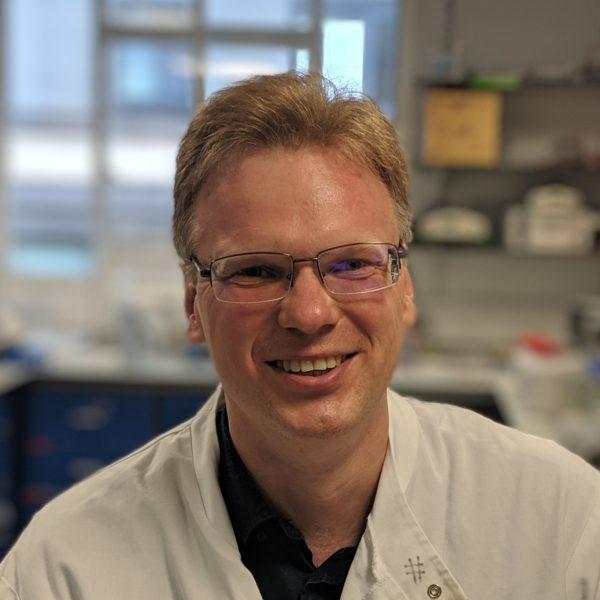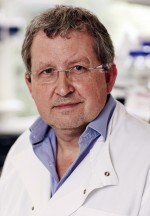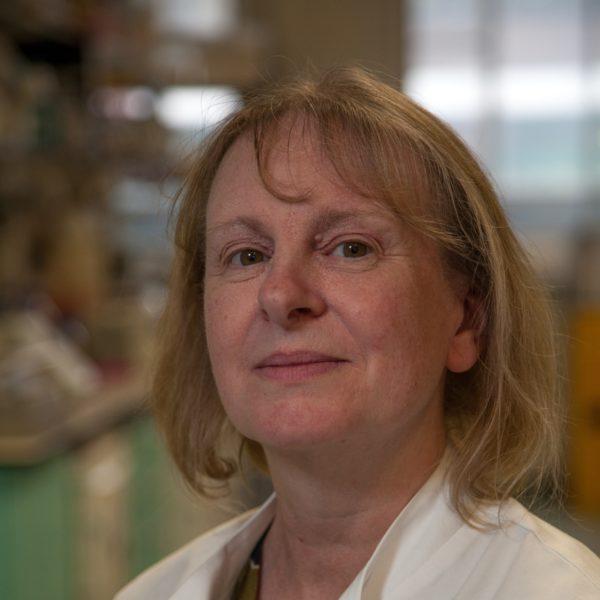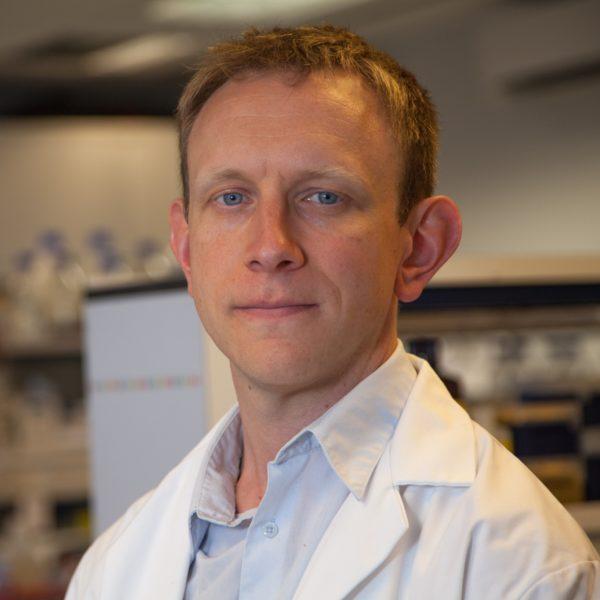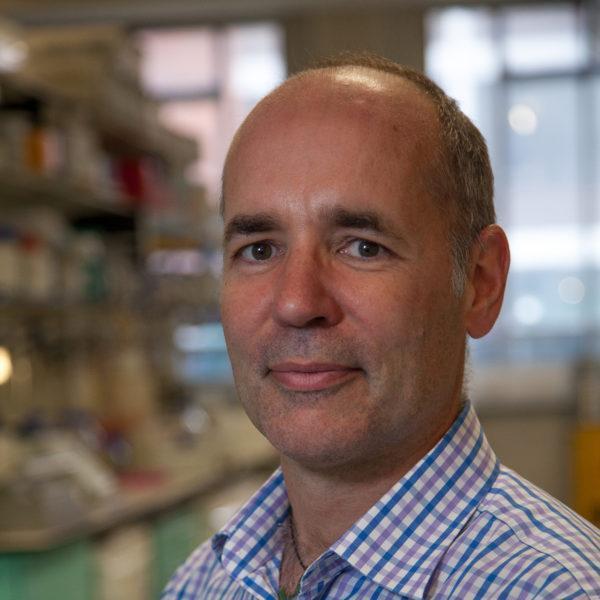Study options
- Starting in
- September 2025
- Location
- Charterhouse Square
- Fees
- Home: £12,850
Overseas: £29,950
EU/EEA/Swiss students
What you'll study
This MSc will give you a theoretical and practical knowledge of modern molecular technologies as applied to human disease, with a focus on cancer. You’ll also learn how to apply and interpret advanced molecular technologies and use them in pathology.
At the heart of the course is a focus on developing your skills in the laboratory, as well as a variety of other scientific and transferable skills. By studying Cancer and Molecular Pathology and Genomics, you’ll equip yourself with the tools to follow a career in academic research, either in the clinical, pharmaceutical or diagnostic setting.
We’ll keep you at the forefront of research: you’ll be taught by internationally renowned lecturers who produce ground-breaking research in cancer biology, genetics, screening, prevention and therapy, so you’ll stay up to date with the most recent medical advances for preventing and treating cancer more effectively.
This programme is delivered by the Barts Cancer Institute, a Cancer Research UK centre of excellence and part of the Cancer Research UK City of London Centre.
Watch our video to find out more about studying at the Barts Cancer Institute.
.png)
Structure
- Eight compulsory modules
- One elective module
- Three-month laboratory project
Compulsory/Core modules
This module covers cell and molecular biology relevant to cancer, including: - The processes of carcinogenesis and DNA damage - The key cellular and molecular processes affected in tumour development - Key proteins and pathways regulating cell proliferation and cell death - A broader concept of malignancy and its nvironment - Processes involved in invasion and metastasis.
This module will provide an understanding of population-based studies and methodology used in cancer epidemiology, focusing on the value of these approaches in cancer prevention and in the design and evaluation of screening programmes. Topics covered include: - The major environmental causes of cancer and their contribution to cancer worldwide - The potential for reducing cancer incidence - The role of screening in cancer control - The prospects for the chemoprevention of cancer in the next ten years.
To provide an understanding of basic disease processes - To become familiar with the terminology and concepts of pathological processes - To develop an approach to identify tissue types and interpret the histological features of pathological processes.
To provide an understanding of the principles band practice of molecular diagnosis in the detection and management of disease - To provide an understanding of quality assurance issues in the diagnostic setting - To give examples of the use of current molecular techniques in the management of disease - To provide practical experience of molecular techniques.
This module aims to provide students with detailed knowledge of the molecular mechanisms involved in cancer development and to give an appreciation of the current hot topics in cancer research and their relevance to cancer diagnosis and management. The major topics to be covered are: - The molecular mechanisms involved in cancer development - The role of the microenvironment in cancer - Emerging changes in classification of cancers - Predisposition to cancer - Cancer stem cells.
The module covers the techniques and knowledge needed to critically appraise published research, and carry out a piece of original research. Topics include: - How to review and interpret published research - How to structure and write a research paper or lab write up - Learn and use a range of statistical methodology - The ethical and legislative framework in which research is undertaken - Training in data preparation and presentation
The module gives the students hands-on experience of key lab techniques and the principles of how to interpret the findings. Techniques include: Skills in measuring accurately using pipetttes, weighing scales Mathematical laboratory skills Immunochemistry Tissue Culture RNA1 extraction and analysis RT-PCR DNA purification, analysis and cloning Flow cytometry
This module will provide detailed teaching on the principles and interpretation of large scale genomic and proteomic approaches to cancer, including: - The application of genomic technology - The working principles of expression array and genotype array technology - The principles of bio-statistical analysis of genomic data - The advantages and limitations of the various genomic approaches described - The use of proteomic approaches in studying cancers.
Compulsory/Core Elective modules
This module provides an opportunity to further develop and apply skills learned during the taught modules by undertaking an independent, critical study and evaluation of an approved and relevant topic, typically within an active research group either within the Institute or at a partner organisation. The specific nature of each dissertation will be determined through discussions between the student, the course director and the project supervisor but will involve applying analytical, investigative and communication skills and utilizing a range of research methods and tools.
The project is a core component of the Masters courses. It is a substantial piece of full-time independent work which occupies the final three months of the course, running approximately from end of April/beginning of May to end of July. A 5,000 word project describing the work must be submitted by a deadline at the end of July, and an oral presentation (12 minutes + 8 minutes questions) is assessed by at least two members of BCI faculty. Students can start some preparation work earlier; May is the latest it can start. The project is undertaken by the student; it is not done by the supervisor on the student¿s behalf. Projects are demanding and involve spending all your hours on the subject, however students learn a huge amount in the process and it really gives them a very good idea about the process of research. Very successful students have in the past stayed on to do higher degrees (PhD) and more. Supervisors and students are also given guidance as to the expectation of their role.
Elective modules
This module will cover the fundamental molecular and biological mechanisms involved in the development of leukaemia and lymphoma. It will specifically address the impact of chromosome abnormalities on the diagnosis, prognosis, risk stratification and management of patients, and include a theoretical and practical understanding of cytogenetic and molecular cytogenetic technology. The contribution of the host microenvironment to tumour cell survival and proliferation will also be discussed.
This module will provide an understanding of the science behind the biological therapies of cancer, and an up-to-date review of the current status of preclinical and clinical trials. The module will also provide an insight into the ways that laboratory research is translated into clinical trials. By the end of the module you will be able to: Understand the basis of biological therapy of cancer; Understand the role of non-malignant cells and mediators in cancer growth and progression
Assessment
- 67% Modules
- 33% Research project
Assessment will be based on written assignments and posters and oral presentations. Examinations will be in the form of online assessments which may consist of timed essay questions, short answer questions or case studies
There will also be a full laboratory project write-up.
Research project
You will also be assessed on a supervised 5,000-word laboratory project. Recent projects include:
- Discovery and characterisation of novel oncogenes that drive carcinogenesis
- Targeting endosomal c-Met signalling in pancreatic cancer
- Managing the evolution of chemotherapy resistance
The laboratory project involves 10.5 weeks of full-time work in one of the Institute’s research centres. If you are a part-time student there may be some flexibility to arrange part-time projects.
—The MSc in Cancer and Molecular Pathology and Genomics was an interesting and educational course. I enjoyed being taught about the most recent advances in the field by leading scientists. The opportunity to work in a lab as part of the research project was highly informative; I discovered my love for research and from this was able to fully decide my next step after my masters.
Arlinda Dullovi, Cancer and Molecular Pathology and Genomics MSc, 2018
Teaching
You’ll be taught through a mixture of formal lectures and small group seminars. The seminars are designed to generate informed discussion around set topics, and may involve student presentations, group exercise and role-play, as well as discussion.
We take pride in the close and friendly working relationship we have with our students. You’ll be assigned an Academic Mentor, who will guide you in both academic and pastoral matters throughout your time at Queen Mary.
Undertaking a masters programme is a commitment and you’ll be expected to spend time studying independently in addition to your contact hours.
If you study part-time, the modules you’ll need to complete the programme will be spread over two years.
Where you'll learn
Facilities
- State-of-the-art research facilities and dedicated teaching laboratory
- Access to specialised scientists and clinicians
- Full access to our library and online resources
- Mentors for non-programme related support, including careers advice
- A dedicated Teaching Centre for administrative support
Campus
Barts Cancer Institute is situated in Queen Mary’s beautiful Charterhouse Square campus. This is where you’ll find our research laboratories, clinical trials centre and where most teaching takes place. The Square is within minutes of the Barts Cancer Centre at St Bartholomew’s Hospital, one of the most advanced cancer centres in Europe.
Rich in history and diversity, Charterhouse Square is a bustling centre of energy and activity. You will get to experience both old and new London.
About the Institute
Barts Cancer Institute
Barts Cancer Institute (BCI) is one of the top five cancer research centres in the UK and is one of 14 Cancer Research UK Centres of Excellence.
Our research goal is to prevent cancer and develop better diagnostic techniques and treatments. We are generously supported by research councils, industry and a number of charities, with the grants awarded totalling in excess of £15m per annum.
BCI is part of Queen Mary’s medical school, the Faculty of Medicine and Dentistry. The School is comprised of two world-renowned teaching hospitals, St Bartholomew's and The Royal London, which make an outstanding contribution to modern medicine. Queen Mary is ranked joint seventh in the UK for the quality of our research (REF 2021).
We are a member of the Russell Group of leading research universities in the UK and proudly hold an Athena Gold Award in recognition of our commitment to gender equality.
Career paths
You’ll leave this programme with the clinical skills and experience necessary to pursue further academic research at PhD or MD level. This programme also provides a strong foundation if you want to work in biotech research, hospital settings or in industry.
Career destinations of past Barts Cancer Institute students include roles in higher education, the NHS, the pharmaceutical industry and charitable trusts. Our graduates go on to jobs such as:
- research assistant
- tissue bank officer
- clinical trials associate
- lab technician
- healthcare scientist
- facilitator of clinical research
- clinical research practitioner
Each year we retain a proportion of our graduates within the Institute as PhD students, research assistants or clinical trials co-ordinators.
- 91% of BCI postgraduate taught students in employment or further study (2020/21)
- 95% of BCI postgraduate taught students in highly skilled work or graduate study (2020/21)
Fees and funding
Full-time study
September 2025 | 1 year
- Home: £12,850
- Overseas: £29,950
EU/EEA/Swiss students
Unconditional deposit
Home: Not applicable
Overseas: £2000
Information about deposits
Part-time study
September 2025 | 2 years
- Home: £6,450
- Overseas: £15,000
EU/EEA/Swiss students
Unconditional deposit
Home: Not applicable
Overseas: £2000
Information about deposits
Queen Mary alumni can get a £1000, 10% or 20% discount on their fees depending on the programme of study. Find out more about the Alumni Loyalty Award
Funding
There are a number of ways you can fund your postgraduate degree.
- Scholarships and bursaries
- Postgraduate loans (UK students)
- Country-specific scholarships for international students
Our Advice and Counselling service offers specialist support on financial issues, which you can access as soon as you apply for a place at Queen Mary. Before you apply, you can access our funding guides and advice on managing your money:
Entry requirements
UK
Degree requirements
A 2:1 or above at undergraduate level in a relevant subject such as Biology, Chemistry, Pharmacology, Medicine from a recognised academic institution.
Applicants with a 2:2 degree will be considered on an individual basis.
Other routes
The programme is open to graduate scientists, clinicians and other medical professionals working in healthcare, the pharmaceutical industry or contract research organisations.
Find out more about how to apply for our postgraduate taught courses.
International
English language requirements
The English language requirements for our programmes are indicated by English bands, and therefore the specific test and score acceptable is based on the band assigned to the academic department within which your chosen course of study is administered. Note that for some academic departments there are programmes with non-standard English language requirements.
The English Language requirements for entry to postgraduate taught and research programmes in the Barts Cancer Institute falls within the following English band:
Band 4: IELTS (Academic) minimum score 6.5 overall with 6.0 in each of Writing, Listening, Reading and Speaking
We accept a range of English tests and qualifications categorised in our English bands for you to demonstrate your level of English Language proficiency. See all accepted English tests that we deem equivalent to these IELTS scores.
Visas and immigration
Find out how to apply for a student visa.

